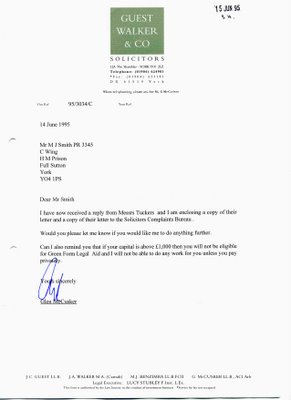I contacted the York solicitors firm of Guest Walker & Co to help me correspond with Tuckers, and they received an interesting reply from Tuckers:
Guest Walker & Co Letter 14 June 1995
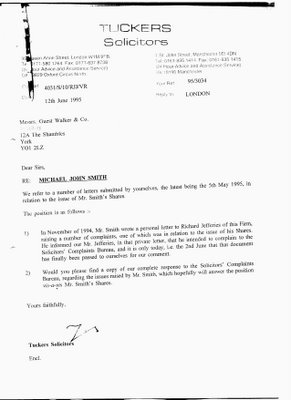
Tuckers Letter 12 June 1995 page 1
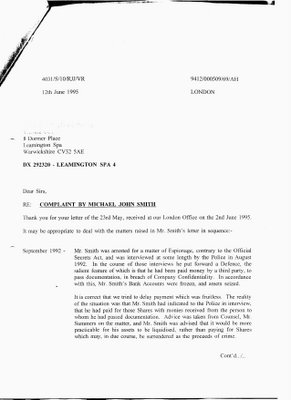
Tuckers Letter 12 June 1995 page 2
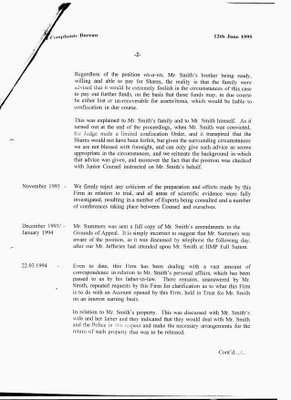
Tuckers Letter 12 June 1995 page 3
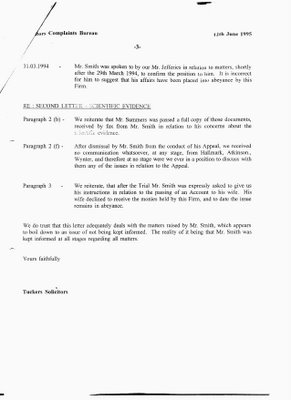
Tuckers Letter 12 June 1995 page 4
Office of the Legal Services Ombudsman
Ombudsman: Michael Barnes
Secretary: Stephen Murray
CONFIDENTIAL
CONFIDENTIAL
22 Oxford Court
Oxford Street
Manchester M2 3WQ
Report of the Legal Services Ombudsman
On Solicitors Complaints Bureau’s handling of a complaint and on the matter to which the complaint itself relates
Ombudsman Reference No.: 7854
SCB Reference No.: 9507/1172/86
Complainant: Mr M J Smith PR 3345, B Wing, H. M. Prison, 5 Love Lane, Wakefield, WF2 9AG
Solicitors: Tuckers, (Mr R Jefferies), 35 Queen Anne Street, London W1M 9FB
Nature of original complaint
1. Mr Smith was an employee of Marconi and in 1993 was convicted of selling secrets relating to Marconi defence products to Russia. Throughout his trial Mr Smith was represented by Mr Jefferies (then of Tuckers, now of O’Keeffes) and his junior counsel was Mr G Summers. After his conviction in November 1993 Mr Smith instructed Mr Jefferies in connection with an appeal against conviction and sentence. He complained that Mr Jefferies failed to pass important information relating to the scientific evidence to Mr Summers who was drafting the appeal. Mr Smith’s financial affairs were also being dealt with at this time by Mr Jefferies. At the time of his arrest he had paid a number of instalments on the purchase of some electricity shares and he complained that Mr Jefferies failed to ensure that the final instalment was paid as a result of which the purchase did not go ahead. Mr Smith withdrew his instructions from Tuckers in March 1994.
Solicitors Complaints Bureau investigation and decision
2. Mr Smith first wrote to the Solicitors Complaints Bureau on 2 December 1994 and on 3 May 1995 the Bureau wrote to the solicitors. The solicitors replied on 12 June 1995 setting out their answer to Mr Smith’s two complaints. Initially the Bureau took the view that the complaint in relation to the shares was in effect one of negligence and therefore not a matter for them. They wrote to Mr Smith on 12 January 1995 to say so. Mr Smith accepted that, but continued to press his other complaint. On 21 July 1995 the matter was passed to a Professional Services Assessor who agreed to consider the complaint in relation to the shares also. On 10 August 1995 Mr Smith sent a further detailed letter dealing with both complaints and including a number of copy letters. This crossed with a letter from the Professional Services Assessor of the same date dealing with the shares issue alone and Mr Smith sent a further letter on 22 August 1995 with further enclosures relating to that point only. The Professional Services Assessor then wrote on a number of occasions to the solicitors to attempt to get their comment on the matters Mr Smith had raised. An answer was finally received on 25 October 1995. The Professional Services Assessor also wrote to Mr Summers who replied on 31 October 1995.
3. On 28 November 1995 the Professional Services Assessor issued his decision. On the issue of the scientific evidence he concluded that there was no blame attaching to the solicitors since it was not clear that the matters Mr Smith had wanted to be passed to Mr Summers were of any real significance and any failure by the solicitor to understand their significance could not be criticised. In any event Mr Smith’s appeal was not dealt with until November 1994, long after he ceased to instruct Tuckers. As to the shares, since Mr Smith had never put the solicitors in funds to pay the final instalment and neither did anyone else on his behalf, there could be no criticism of the solicitors either.
Referral to Ombudsman
4. Mr Smith first wrote to this Office on 21 February 1996 and sent an application form on 25 February 1996. He alleged that the Solicitors Complaints Bureau had misunderstood his complaint and had failed to investigate properly the matter. He repeated his allegations against his solicitors.
Assessment
5. I have reviewed the file in this case. I do not consider that the Solicitors Complaints Bureau has reached reasonable conclusions based on the evidence before them and I therefore conclude that the solicitors in this case provided an inadequate professional service. In relation to the first complaint I consider the matter to be straightforward. On 26 November 1993, at the request of his solicitors Mr Smith forwarded several pages of notes for Mr Summers who was drafting his appeal. Mr Smith was sent a copy of the draft grounds of appeal together with an explanatory note from Mr Summers. It was clear to Mr Smith that Mr Summers had misunderstood certain technical points in relation to the scientific evidence. At a conference with Mr Jefferies on 13 January 1994 he explained his dissatisfaction with the draft grounds of appeal. Thereafter the draft grounds were perfected without significant alteration. In November 1994 Mr Summers himself saw Mr Smith and discussed the scientific evidence. Realising the significance of Mr Smith’s points, Mr Summers at a late stage set about amending the appeal. The solicitors claim that Mr Jefferies discussed the contents of the conference on 13 January 1994 with Mr Summers the following day. A letter from Mr Summers to Mr Smith dated 7 November 1994 makes it clear that he was not made aware of Mr Smith’s dissatisfaction with the appeal as it stood. It seems clear that either Mr Jefferies failed to understand the significance of what he was being told and chose not to trouble Mr Summers with it or he simply omitted to bring it to his attention. Mr Summers (contrary to the Professional Services Assessor’s decision) considered that the matters raised went both to conviction and sentence and were important. I consider that there is clear evidence that the solicitor failed in his professional duty to Mr Smith to relay important instructions to counsel charged with settling grounds of appeal. I do not agree that Mr Jefferies’ failure to understand the significance of the matter is not open to criticism. It plainly was an important matter to Mr Smith who was obviously keen that Mr Summers be made aware of its significance. If he did not understand what he was being told Mr Jefferies should have made sure that he had clarified it before speaking to Mr Summers. The fact that Mr Smith ceased to instruct Tuckers in March 1994 does not in any way diminish the fact that Mr Jefferies failed to act on instructions whilst Mr Smith was still his client. In fact Mr Smith did not become aware that his comments had not been passed on to Mr Summers until quite close to his appeal hearing in November 1994. For that reason the letter from Mr Smith to Mr Jefferies in March 1994 praising his efforts, which was relied on by the Professional Services Assessor in his decision, is not significant.
6. The question of the share purchase is more complex. Mr Smith complained that he instructed Mr Jefferies to secure his position vis-a-vis the shares after his arrest in August 1992. He was advised that his own assets had been seized and his bank accounts frozen. Mr Smith denies that this was the case and states that as at February 1993 standing orders were still being paid from his account. In any case he advised Mr Jefferies that his brother was willing to pay the last instalment. What is not in doubt is that when his sister-in-law contacted the solicitors at Mr Smith’s prompting she was advised that since it was likely that assets such as shares would be confiscated on conviction it would be better to liquidate Mr Smith’s assets and not to pay out further funds in this regard. The solicitors also claim that they advised Mr Smith of this and that this was advice also received from Mr Summers. Mr Smith denies that any such advice was given and has produced a letter from Mr Summers (dated 28 June 1995) in which Mr Summers denies giving such advice. In point of fact no confiscation order was made at the trial and the shares would not have been forfeit. I consider that the Professional Services Assessor has not reached a reasonable conclusion in respect of this complaint. Whatever advice was given to Mr Smith about the advisability of obtaining the shares it is clear that as late as 23 March 1993 he was still intent on arranging for payment for them. By letter of that date he instructed Mr Jefferies to make whatever arrangements were necessary to do this. He also asked his brother to contact Mr Jefferies to arrange for that payment to be made.
7. At that point Mr Jefferies, apparently of his own motion, advised against this and the payment was never made with the consequence that the opportunity to buy the shares was lost and Mr Smith missed out on the substantial profit to be made on re-sale. On 31 March 1994 Mr Jefferies wrote to Mr Smith in the following terms, “if the problem really boils down to your shares in Electricity Companies..... I can only say that I am waiting for authorization from Mr Tucker to commence work in those areas.” Furthermore it appears that on 18 February 1993 Mr Jefferies, on Mr Smith’s instructions, arranged for payment of a final instalment for the purchase of some British Telecommunications shares. This does not seem to me to square with the solicitors’ assertion that their advice had been throughout not to attempt to obtain shares. Indeed Mr Smith states that Mr Jefferies told him verbally in March 1993 that he would attempt to reinstate Mr Smith’s purchase of the shares. In the light of the March 1994 letter I am inclined to accept this. In my view the likely conclusion which falls to be drawn from this evidence is that the solicitors never advised Mr Smith against the purchase of shares. Even if they did Mr Smith instructed them to proceed in such a purchase. That was an instruction which should have been followed (albeit, if necessary with a letter confirming that it was against the solicitors’ advice). Therefore when Mr Smith’s sister-in-law contacted the solicitors to make arrangements to pay the last instalment it was not open to Mr Jefferies to advise against such an act, at any rate without informing Mr Smith. He was not Mr Smith’s brother’s solicitor and owed no duty to him. He did owe a duty to Mr Smith. The Professional Services Assessor placed reliance in his decision on the fact that Mr Smith’s brother never put Tuckers in funds. That was for the simple reason that he was told not to by Mr Jefferies, a fact which Mr Smith only became aware of after it was too late to retrieve the situation.
Conclusion and recommendation
8. In all the circumstances I consider that the solicitors have on two occasions ignored instructions from Mr Smith and therefore failed to provide an adequate professional service. I am not in a position to make an informed judgement of to what extent, if at all, Mr Smith’s appeal was jeopardised nor whether success would have been assured if Mr Smith’s instructions had been followed. Similarly, I cannot assess what the financial consequences of not completing the electricity shares purchase was. I am however inclined to the view that in the case of each omission Mr Smith was caused significant distress for which he should receive compensation. I therefore recommend, pursuant to Section 23 (2) (c) Courts and Legal services Act 1990, that Tuckers pay the sum of £500 to Mr Smith in respect of the distress caused to him by his legitimate belief that his appeal had been jeopardised and by the loss of the opportunity to profit from the purchase of shares.
Michael Barnes
Legal Services Ombudsman
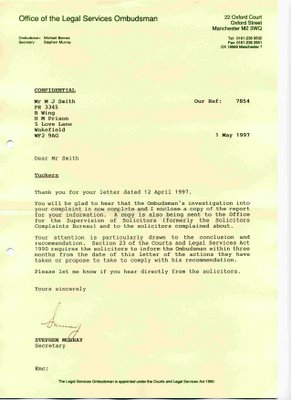
Legal Services Ombudsman Letter 1 May 1997
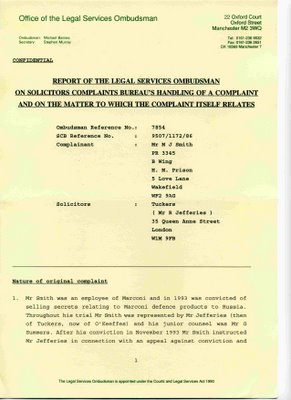
Legal Services Ombudsman Report April 1997 page 1
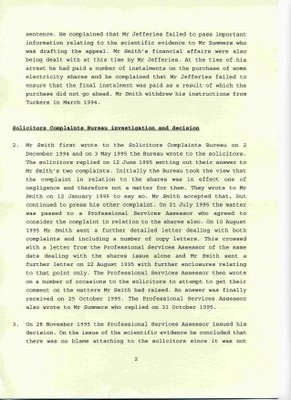
Legal Services Ombudsman Report April 1997 page 2
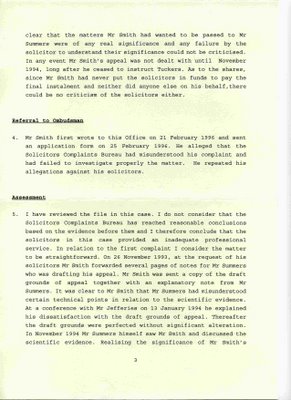
Legal Services Ombudsman Report April 1997 page 3

Legal Services Ombudsman Report April 1997 page 4
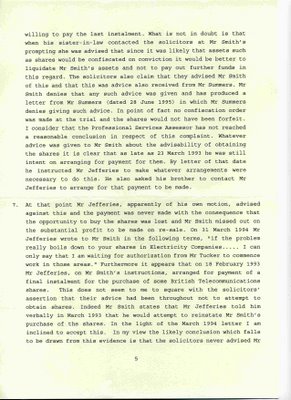
Legal Services Ombudsman Report April 1997 page 5
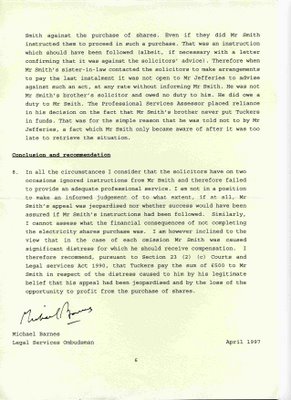
Legal Services Ombudsman Report April 1997 page 6
